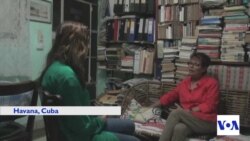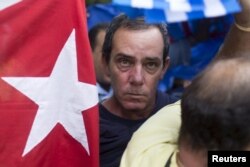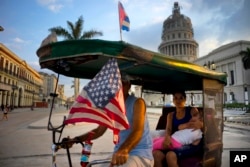Cuban dissident Miriam Leiva says that if she could meet President Barack Obama, she would tell him that she is thankful for his policies toward the island nation that are "improving Cubans' lives, Cubans' way of looking at the world."
Leiva, a co-founder of Ladies in White, an opposition group, may get her chance to meet with Obama. The U.S. Embassy in Cuba has invited her to what she was told was a "very high-level meeting" at the embassy in Havana.
The invitation didn't mention Obama, but the meeting will take place during his visit Tuesday morning.
Leiva, who is also an independent journalist, told VOA that if the meeting is with Obama, she hopes to "listen directly to his views and express mine."
The 69-year-old widow said the thawing of ties between the U.S. and Cuba had "eased the tension in which we have lived for 55 years." But Leiva is realistic, too. "Obama won't change Cuba. But he's giving Cubans, the ones who should be in charge of the shift, the possibility to have ways, means, ideas and contact so that we actually make those changes."
WATCH: Cuban Dissident Would Thank Obama for 'Improving Cubans' Lives'
The White House reiterated Friday that it would not negotiate with the Cuban government on the people Obama chooses to meet with during his trip to the communist-run nation.
"The list of people invited to meet with the president in Cuba is non-negotiable," White House spokesman Josh Earnest told reporters in a daily press briefing.
"I would not be surprised if there are people on that list that the Cuban government prefer we not meet with ... but I can tell you the president is going to move forward in those meetings and have a conversation about human rights," Earnest said.
Obama is set to leave for Cuba on Sunday, becoming the first sitting U.S. president to visit the island nation in nearly 90 years. The White House has said that meetings with Cuban pro-democracy activists are a priority for Obama's trip.
On Thursday, Cuba's government took issue with Obama's plans to use his visit to lobby for change in Cuba.
Foreign Minister Bruno Rodriguez said "various U.S. officials have declared in recent hours that the objective of Obama's measures is empowering the Cuban people. The Cuban people empowered themselves decades ago,'' a reference to the country's 1959 revolution.
Dissidents on the island told VOA on Friday that Obama's visit and the diplomatic restart didn't mean the repression had decreased. The Cuban Commission for Human Rights and National Reconciliation stated that in 2015, more than 8,000 Cubans were arrested.
"To the government of Cuba [it] is easier to improve the relations with his so-called archenemy than with the Cuban people. Let's take advantage of this opportunity and urge the Cuban government to fix his ties with the Cubans," said Gerardo Sánchez, secretary general of the Cuban Commission for Human Rights and National Reconciliation.
President Raul Castro's administration has denied that any arbitrary detentions take place in the country and has maintained that Cubans' fundamental human rights are acknowledged.
Despite the differences between the United States and Cuba, both countries have taken steps to increase economic ties ahead of Obama's trip.
Earlier this week, the U.S. government said U.S. banks could process financial transactions from Cuba, and it eased some travel restrictions for Americans hoping to visit Cuba, allowing "people-to-people" visits instead of just costly tour groups.
On Thursday, Cuba reciprocated by announcing it would cut the 10 percent tax imposed on dollar transactions after assessing the impact of the U.S. relief.
Cuba also said Thursday that it would air Obama's speech in Cuba live on national television. Rodriguez said Cubans would be able to draw their own conclusions from Obama's speech.
The United States and Cuba endured 55 years of hostilities, after revolutionary Fidel Castro overthrew the U.S.-supported dictator Fulgencio Batista.
Obama and Raul Castro, Fidel's brother, renewed diplomatic relations in late 2014, eased trade barriers in the months since then and reopened embassies in Havana and Washington.
Later this year, American air carriers are set to resume regular flights to the island nation in the Caribbean Sea that is 145 kilometers off the southeastern U.S. coast.
.Alberto Pimienta and Megan Duzor in Washington contributed to this report.








